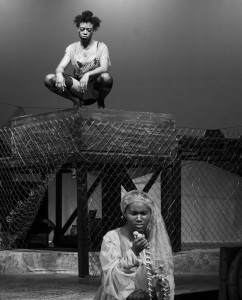
First-year Sylvia Michels wasn’t exactly sure how her parents would react to her first role in a college theater production in Christine Evan’s Trojan Barbie. Her character, Polly X, is a rebellious, art-loving, punk princess who is doomed to be sacrificially murdered—but not before some of the soldiers can get their hands on her.
“My theater director in high school was a pastor, so everything was very censored and very child-friendly,” she said, “So to be in a play where I was swearing and drinking is very different.”
The provocative play adapted from Euripides’ Trojan Women touched on several hard-hitting topics that revolve around how women suffered during war. Unlike most plays performed in high school, Trojan Barbie explored a complex range of intense emotions and the physical struggles endured by the characters.
“You’re not just playing a love-struck girl or a motherly figure. It’s very real, uncensored stuff,” Michels said
About seven years ago, the Department of Theatre and Dance revised their mission to include a social justice focus.
“I believe that all theatre has a place in our community, but I think that theatre is uniquely able to engage people on a very personal level, in new ideas or in self-expression; in finding ways to empathize with others,” Director of Trojan Barbie and Co-chair of the Department of Theatre and Dance Amy Seham said.
Senior Honors Theatre and Communications double-major Comfort Dolo, who played the role of Hecuba, states that the social justice focus of the theatre department has drastically changed her outlook on life.
“It’s taught me that there are so many people in the world and I feel like a lot of times we take for granted that we’re surrounded by these people, and even though we feel like we’re coming from the same place, everybody has their own story to tell,” Dolo said.
In Dolo’s final performance in Anderson Theater, she played Hecuba, who lost her husband and children in the Trojan War.
“This is probably the most different and difficult roles that I’ve ever played. One of the difficulties I faced was that I’m a college student who doesn’t have experience with losing children. I don’t really have that kind of background. So how do I, as an actress, embody those different kinds of emotions that I’ve never really felt, but need to portray, especially for a long period of time?” Dolo said.
Luckily, Seham’s directing style gave Dolo the tools she needed to embody such an intense character.
“We’re not just doing theater as a chance to show off on stage,” Seham said, “We’re doing theater because we have something to say, and we want to engage our audience with those ideas. And so, given that, it’s very important that the actors understand what those ideas are and collaborate. I want the actors’ own thoughts and feelings about these issues to become part of their performance, and we spent a lot of time doing research and making sure we understood what the issues were.”
Seham, who has been working at Gustavus for over 16 years, noted the importance of exploring applied theater and the ideas of the late Augusto Boal, who’s Theatre of the Oppressed drastically influenced the ideas and application of modern social justice theatre.
“His philosophy was that when people actually engage in ideas and actually get on their feet and perform resistance to oppression. He calls it ‘rehearsal for revolution—it’s transforming not only to sit and watch something, but to participate in it, and to have it become real for [actors],” Seham said
From dance projects representing genocide, to plays illustrating the struggles of women refugees, this social justice philosophy finds its way into almost all facets of the Department of Theatre and Dance. While Trojan Barbie explored themes of women, violence, and ancient Greek history, the department’s next main stage theatre production, Hair: The American Tribal Love-Rock Musical, which will also be directed by Seham, explores war themes in a much more loud and colorful way while simultaneously bringing up themes of sexual revolution.
Other social justice projects in the works include several performances and workshops by I Am, We Are, including the Building Bridges opening show. Seham’s Social Justice Theatre class will also put on an event called “Social Justice Soup,” which will consist of monologues written and performed by students based on interviews about the topic of race.
Dolo, who will be working on her honors project this spring with Senior Honors Theatre Major Rob Ward, stressed the importance of attending social justice workshops and performances.
“I think it’s a good outlet for learning and for teaching and I think it gives people the chance to explore concepts that usually don’t come up in everyday conversation,” Dolo said.
Michels, who enjoyed the refreshing challenge brought forth by Trojan Barbie’s insightful script, looks forward to participating in more productions and classes. Despite the department’s unique approach to theatre that often includes racy and controversial material in order to encourage discussion, Michels ultimately received support and encouragement from her parents.
“It’s more about the skillset and the passion and the camaraderie, rather than what specific character you’re playing,” she said, “so that was really nice that they understood that and just let me go with it,” Michels said.